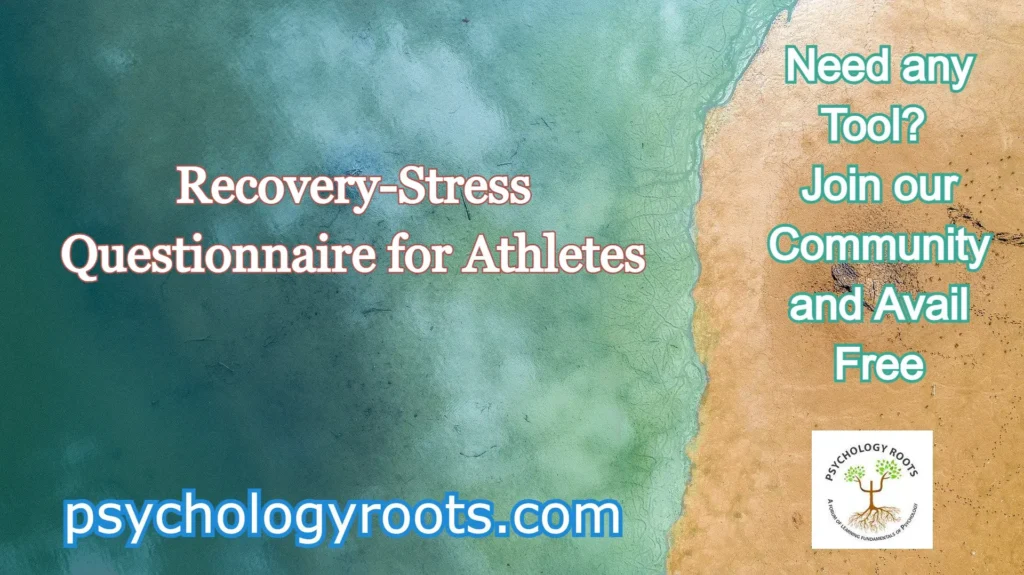Table of Contents
Recovery-Stress Questionnaire for Athletes
Here in this post, we are sharing the “Recovery-Stress Questionnaire for Athletes”. You can read psychometric and Author information. We have thousands of Scales and questionnaires in our collection (See Scales and Questionnaires). You can demand us any scale and questionnaires related to psychology through our community, and we will provide you with a short time. Keep visiting Psychology Roots.
About Recovery-Stress Questionnaire for Athletes
Scale Name
Recovery-Stress Questionnaire for Athletes (RESTQ-Sport)
Author Details
Kellmann, M., & Kallus, K. W.
Translation Availability
English

Background/Description
The Recovery-Stress Questionnaire for Athletes (RESTQ-Sport) is a specialized assessment tool designed to measure an athlete’s recovery and stress levels in the context of training and competition. Developed by Kellmann and Kallus, this questionnaire evaluates the balance between stressors (physical, emotional, and cognitive) and recovery processes that are essential for peak athletic performance.
The RESTQ-Sport comprises general and sport-specific scales, offering a comprehensive picture of an athlete’s overall well-being. It includes items related to physical recovery, emotional recovery, and stress caused by overtraining or external pressures. This tool is particularly valuable for coaches, sports psychologists, and trainers to prevent burnout, overtraining, and injury while enhancing athletic performance.
The questionnaire typically includes 77 items rated on a 7-point Likert scale, where respondents reflect on their experiences over the past 3 days and nights. By identifying areas of imbalance, the RESTQ-Sport aids in creating tailored interventions to optimize recovery and performance.
Administration, Scoring and Interpretation
- Obtain a copy: Acquire the RESTQ-Sport from authorized distributors or publications.
- Explain the purpose: Inform athletes that the questionnaire assesses their recovery and stress levels for better performance and well-being.
- Provide instructions: Ask participants to rate each item based on their experiences in the past 3 days and nights, using the 7-point scale.
- Approximate time: The questionnaire takes approximately 10–15 minutes to complete.
- Administer the scale: Ensure the setting is private and conducive to honest and accurate responses.
Reliability and Validity
- Reliability: The RESTQ-Sport has demonstrated excellent internal consistency, with Cronbach’s alpha values typically exceeding 0.85 across subscales.
- Validity: The tool’s construct validity is supported by its ability to differentiate between overtrained and well-recovered athletes. Studies also confirm its criterion validity, linking scores to performance outcomes and psychological well-being.
Available Versions
77-Items
Reference
- Kellmann, M., & Kallus, K. W. (2001). Recovery-Stress Questionnaire for Athletes: User Manual. Champaign, IL: Human Kinetics.
- Kellmann, M. (2010). Preventing overtraining in athletes in high-intensity sports and stress/recovery monitoring. Scandinavian Journal of Medicine & Science in Sports, 20(2), 95–102. https://doi.org/10.1111/j.1600-0838.2010.01192.x
- Kallus, K. W., & Kellmann, M. (2002). The recovery-stress questionnaire for athletes. In M. Kellmann (Ed.), Enhancing recovery: Preventing underperformance in athletes (pp. 103–121). Champaign, IL: Human Kinetics.
Important Link
Scale File:
Frequently Asked Questions
Q1: What is the purpose of the RESTQ-Sport?
It helps monitor stress and recovery levels in athletes to optimize performance and well-being.
Q2: Who can use the RESTQ-Sport?
Athletes, coaches, sports psychologists, and trainers use it for assessing and managing training loads.
Q3: How many items are included in the RESTQ-Sport?
The standard version includes 77 items covering general and sport-specific aspects.
Q4: Is the RESTQ-Sport validated for use across different sports?
Yes, it has been validated for use in a variety of sports and competitive levels.
Q5: Can the RESTQ-Sport predict athletic performance?
While it doesn’t directly predict performance, it identifies recovery and stress imbalances that may impact performance.
Disclaimer
Please note that Psychology Roots does not have the right to grant permission for the use of any psychological scales or assessments listed on its website. To use any scale or assessment, you must obtain permission directly from the author or translator of the tool. Psychology Roots provides information about various tools and their administration procedures, but it is your responsibility to obtain proper permissions before using any scale or assessment. If you need further information about an author’s contact details, please submit a query to the Psychology Roots team.
Help Us Improve This Article
Have you discovered an inaccuracy? We put out great effort to give accurate and scientifically trustworthy information to our readers. Please notify us if you discover any typographical or grammatical errors.
Make a comment. We acknowledge and appreciate your efforts.
Share With Us
If you have any scale or any material related to psychology kindly share it with us at psychologyroots@gmail.com. We help others on behalf of you.